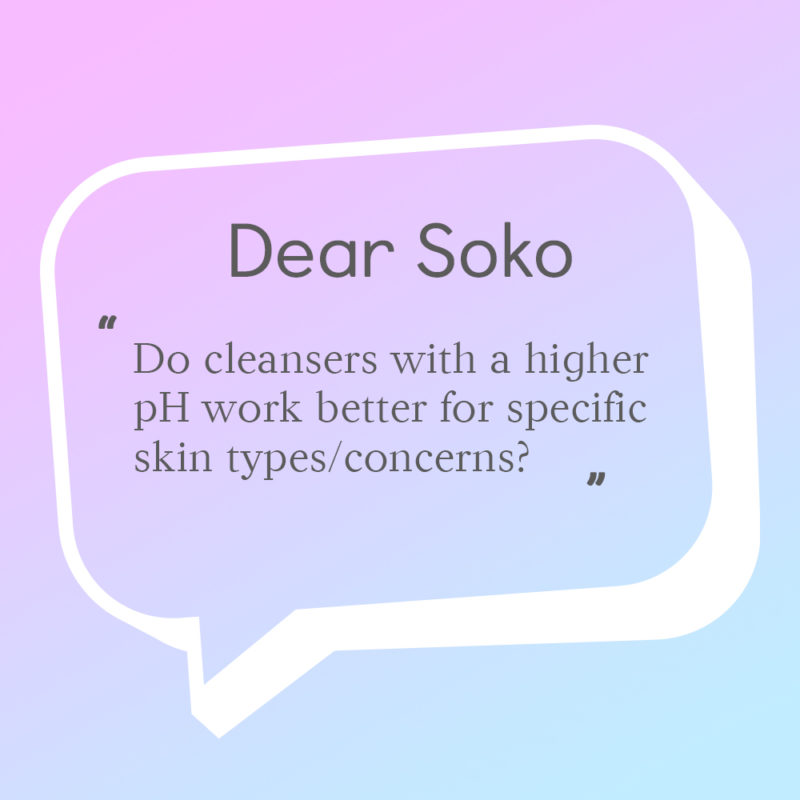Does the pH of your cleanser really matter? Welcome to Dear Soko, a series dedicated to answering your biggest skin care questions with advice from Soko Glam’s skin experts. Whether you’re confused about specific ingredients or what you need to do to achieve healthier skin overall, these experts are here to guide you.
This week’s question comes from commenter Lora who asked: “Do cleansers with a higher pH work better for specific skin types/concerns? I know that low pH is all the rave, but I’m curious about those with a higher pH that get good reviews.”
Here, a Soko Glam skin expert’s answer:
—
Dear Lora,
You are so right, low pH cleansers are huge right now! Let’s break down why this is, so that we can understand what kinds of cleansers each skin type should be looking for.
Just so we are all on the same page, pH ranges from 0-14. This number indicates the ratio of acidity and alkalinity of a substance, with 0 being the most acidic, 7 being neutral, and 14 the most alkaline. Healthy skin is slightly acidic, usually sitting pretty at a 5.5. Skin that is too acidic can become irritated, oily, and prone to breaking out. Skin that is too alkaline can appear dull and be so dry it starts to flake. My face gets itchy just thinking about this!
Now if this true, how can some higher pH cleansers get such great reviews? The answer is simple, and comes down to a cleanser’s best friend: Toner. First off, cleansers shouldn’t be too low in pH because in order to properly dissolve dirt and be effective in cleansing, there must be some alkalinity. This is why after your cleansing steps, no matter the pH of the products, it is recommended to use a toner. Well-formulated toners are formulated not only to wipe off the last of any debris on the face, but also to reset your skin’s pH balance after your cleansing step! As long as you are using a properly pH-balanced toner, like the Acwell Licorice pH Balancing Cleansing Toner (this toner proudly displays its 5.5 pH right on the label) your cleanser’s pH is less important.
RELATED: Why The pH Level of your Skin Care Products Matters
That being said, there are skin types that may want to be more careful about the pH levels of their cleansers. While normal skin types can get away with using the most variety of cleansers, sensitive and acne-prone skin may want stick to ph-balanced cleansers, such as the Acwell No 5.5 pH Balancing Micro Cleansing Foam. This is because sensitive and acne-prone skin types can have more vulnerable acid mantles. The acid mantle is what tops our skin with a thin protective barrier made up of ceramides, free fatty acids and lipids. A damaged acid mantle can compromise the health and look of our skin.
It’s not all about skin type though. Just as much of skin care is about individual skin needs, so is cleansing. In order to determine if a cleanser is playing nice with your acid mantle, you can gauge your skin after cleaning. If after cleansing, your faces feel tight or as if it might crack when you smile, your acid mantle is most likely being affected. The feeling of being squeaky clean is not what’s best for healthy skin. After cleansing, your skin should feel clean but also moisturized and nourished. As always, how your face feels and how your skin looks, is going to be more important than what is on the label of the product or what the reviews are saying.
Warmly,
Your Skin Expert
